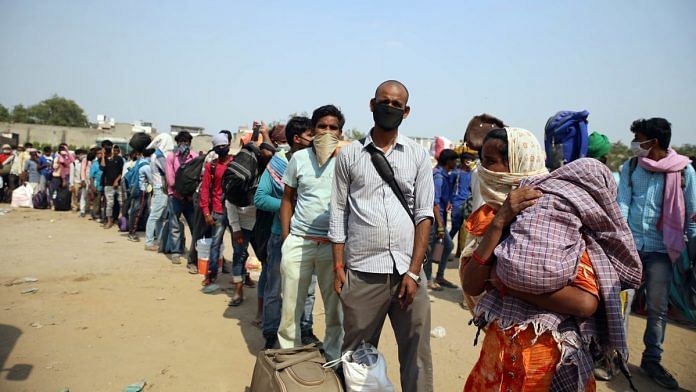Uncaring states
Arundhati Katju | Lawyer at the Supreme Court
The Indian Express
Katju argues that the recent amendments to labour laws in the wake of the migrant crisis are unconstitutional. “Rather than encouraging workers to return by securing wages and improving working conditions, the amendments introduced by the states are removing basic labour law protections.” Restricting migrants from returning home stems from a shortage of labour, which results in an increase in wages, but this violates their right to move freely throughout the country. Some states have decided to take action against those who left for home, which is also not supported by the law. “It is tempting to see the pandemic as a once-in-a-lifetime opportunity to push through labour reforms. Even so, it is unclear that the wholescale abrogation of the labour law system benefits either labour or industry.”

C. Raja Mohan | Director, Institute of South Asian Studies, National University of Singapore
The Indian Express
With India joining the numerous countries calling for a probe into the origins of coronavirus, the author explains that “Unanimous approval of the resolution seeking a probe into the origin of Covid-19 and role of global health body will be a setback for Beijing.” However, Mohan cautions that “it is one thing to pass to a resolution and entirely another to compel a great power like China to comply. Any current effort to understand the origin and spread of the COVID-19 virus and a long-term strategy to deal with future pandemics must necessarily involve more than a measure of Chinese cooperation.”

Social distancing from the powerless
Sanjay Hegde | Senior advocate of the Supreme Court
The Hindu
The coronavirus pandemic and subsequent lockdown have resulted in the courts of India moving to the virtual platforms. While this may be the right move, it doesn’t come without caveats. “It calls for visual performance art on the part of lawyers as well as judges,” says Hegde, who witnessed the hearing of the case of migrant labour walking home. With the top court declaring that no migrant workers are walking back home, this statement blew up, with law reporters transmitting it to the world outside — something that wouldn’t have happened if it was a physical court and not a virtual one. “Judicial abnegation by the top court is not healthy for an institution trusted as being the protector and enforcer of rights,” writes Hegde.

Ensuring access and equity in education
Ramesh Pokhriyal ‘Nishank’ | Union minister of Human Resource Development
Hindustan Times
As Finance Minister Nirmala Sitharaman announced a number of measures for the education sector as part of the Rs 20 lakh crore stimulus package even as India enters phase four of the lockdown, Pokhriyal says education is at a tipping point. “Combining the best of traditional classroom learning with digital learning, education is on the cusp of change.” He also focuses on equal opportunities for students in rural and urban areas and ends by noting, “India is ready and equipped to reimagine the future of digital education through PM e-Vidya while addressing the needs and rights to education for every child.”

Unemployment rate remains at 24%, but hard times ahead for labour
Mahesh Vyas | MD & CEO, CMIE
Business Standard
The author expresses concern for the increasing unemployment rates and the difficulties that lie ahead for the economy as well as the labour force due to the lockdown. The uncertainty of lockdown and fear of disease and loss of livelihood are factors that are likely to keep labour away, the author notes. The allocation of Rs 400 billion to the Mahatma Gandhi Rural Employment Guarantee Scheme (MGNREGS) is likely to have a good impact on rural labour, he says, but the economy will take a longer time to recover and the future of the labour is of ‘more tapasya and more tyag’.
Open, fair and non-discriminatory conditions key to foreign investment
LI Baijun | Economic and Commercial Minister at Embassy of China in India
Mint
The author comments that investments depend on the growth stability, infrastructure, investment opportunities and fair and friendly treatment to foerign investments. If an economy can do well in these aspects and make continuous improvement, it will gain the first opportunity and advantage in the international competition to attract foreign investment, he notes. He adds that adopting discriminatory restrictions against certain foreign investments will not achieve the desired policy results and will discourage the confidence and enthusiasm of all foreign investments to enter a particular market. Therefore, an “open, fair and non-discriminatory business environment” should not be neglected as the core policy element.


How potent is India’s economic vaccine
Sonal Varma | Research Analyst, Asia Economics, Nomura
Aurodeep Nandi | Research Analyst, Asia Economics, Nomura
The Financial Express
The authors explain the key takeaways from the economic stimulus package announced last week. The Centre’s announcement of longer-term reforms is focused mainly on agriculture and the industrial sectors. Relief has been given to small businesses vulnerable segments through MGNREGA. But the stimulus package did not offer any tax relief, interest subvention or wage subsidy to the aviation, hospitality, travel and tourism sectors, which are likely to suffer from lower revenues, the authors note.

Solutions for the jigsaw puzzle that is Indian agriculture
Ajit Ranade | Economist and a senior fellow at The Takshashila Institution
Mint
The author writes that Indian agricultural sector is complex and cannot be solved in New Delhi alone, but in district headquarters and state secretariats, or even village panchayats and talukas. Any decisive impact on farming will come from actions outside the sector, namely reforms in industry and services. India has incredible agro-climatic diversity and the ‘one-size-fits-all policies’ will not work across the nation. Farm policies have to reflect local needs and exigencies, and the Centre has a limited role in this. Therefore, local solutions need to emerge, to solve what the author calls the giant jigsaw puzzle of Indian agriculture.




